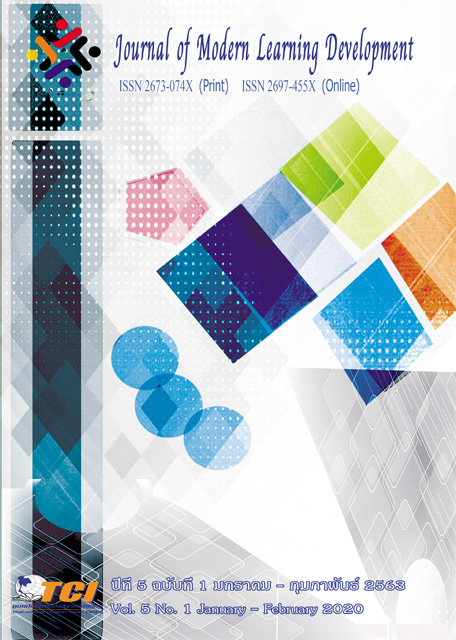The Learning Management in Accordance with the Threefold Training Principles in the Civil Duty, Culture and Social Living Contents of Teachers in Schools under the Office of Secondary Education Service Area 25
Main Article Content
Abstract
The objectives of this research were: to study the conditions, to compare and study the ways to develop the learning management in accordance with the threefold training principles in the civil duty, culture and social living contents of teachers in schools under the Office of Secondary Education Service Area 25. This study was conducted by means of the quantitative research. The samples in this study were 76 teachers in the research area, selected based on the method of Krejcie& Morgan. The tools used to collect the data were questionnaires and interview forms. The statistics used in the data analysis were: Frequency, Percentage, Mean, Standard Deviation, One Way ANOVA, f-test, Scheffe’s Post hoc comparison.
The research results were as follows: The learning management in accordance with the threefold training principles in the civil duty, culture and social living contents of teachers in schools under the Office of Secondary Education Service Area 25 in overall and in studied aspects: precepts, meditation and wisdom was rated at a high level of practice.
The comparison results of the learning management in accordance with the threefold training principle in the civil duty, culture and social living contents of teachers in schools under the Office of Secondary Education Service Area 25 showed its high level of practice with indifference at the statistical significance level of .05; which denied the set hypothesis. Classified by the samples’ work experiences, the statistical significance difference was seen at the level of .05 which accepted the prior set hypothesis.
The ways to develop the learning management in accordance with the threefold training principle in the civil duty, culture and social living contents of teachers in schools under the Office of Secondary Education Service Area 25 are that in the aspect of precept, there should be organizing of learning activities for students to have public mind, let students be honest and teach them to practice according to the 5 precepts, cultivate and encourage students to know the effects in various aspects of honesty physically, verbally and mentally. In the aspect of meditation, there should be the practice of walking meditation and cultivation of morality by having teachers and students to exchange storytelling and moral stories, various comments received, organizing moral and ethical training activities for students of all levels. In terms of wisdom, there should be organizing of 4 nights and 5 days spiritual development camps for the forth high school students every year at the Dharma Weluwan Center, KhonKaen province to train them to think by using problem-solving thinking processes, organizing training activities or activities that focus on real practice for students to develop their intelligence, knowledge and ability kept up with the changes.
Article Details
References
พระจินดา สุชาโต (พรามชาลี). (2561). สภาพการจัดการเรียนรู้สังคมศึกษาเพื่อเปรียบเทียบระดับการปฏิบัติการและเพื่อศึกษาแนวทางเกี่ยวกับการจัดการเรียนรู้สังคมศึกษาสาระหน้าที่พลเมือง วัฒนธรรม และการดำเนินชีวิตในสังคม ด้วยหลักพรหมวิหาร4 ของครูสังกัดสำนักงานเขตพื้นที่การศึกษามัธยมศึกษา เขต 24 จังหวัดกาฬสินธุ์.ครุศาสตรมหาบัณฑิต สาขาวิชาการสอนสังคมศึกษา. บัณฑิตวิทยาลัย: มหาวิทยาลัยมหาจุฬาลงกรณราชวิทยาลัย.
พระธรรมปิฎก (ป.อ.ปยุตฺโต). (2537). การศึกษาเพื่ออารยธรรมที่ยั่งยืน. กรุงเทพมหานคร : บริษัท สหธรรมิกจำกัด.
พระพันธวัฒน์ ธมฺมวฑฺฒโน (ภูมิรัง). (2561). การจัดการเรียนรู้ด้านจริยธรรมของผู้เรียน ในกลุ่มสาระการเรียนรู้สังคมศึกษา ศาสนา และวัฒนธรรม ระดับมัธยมศึกษาตอนต้น ของโรงเรียนในสังกัดเทศบาลนครขอนแก่น. ครุศาสตรมหาบัณฑิต สาขาวิชาการสอนสังคมศึกษา. บัณฑิตวิทยาลัย : มหาวิทยาลัยมหาจุฬาลงกรณราชวิทยาลัย.
พระสุทัศน์ อาภาธโร (อรัญมาลา). (2562). การบูรณาการการจัดการเรียนรู้ สาระหน้าที่พลเมือง วัฒนธรรมและการดำเนินชีวิตในสังคม โดยใช้สะเต็มศึกษาในโรงเรียนมัธยมศึกษา สังกัดสำนักงานเขตพื้นที่การศึกษามัธยมศึกษา เขต 26. พุทธศาสตรมหาบัณฑิต การสอนสังคมศึกษา. บัณฑิตวิทยาลัย : มหาวิทยาลัยมหาจุฬาลงกรณราชวิทยาลัย.
วิภาพรรณ พินลา และคณะ. (2561). การจัดการเรียนรู้สังคมศึกษาในยุคศตวรรษที่ 21. กรุงเทพมหานคร: ซียูเคชั่นบุ๊ค.
สาโรช บัวศรี. (2544). ปรัชญาการศึกษาสาหรับประเทศไทย: จุดบรรจบระหว่างพุทธศาสนากับประชาธิปไตย. กรุงเทพมหานคร : มหาวิทยาลัยศรีนครินทรวิโรฒ,
สำนักงานคณะกรรมการการศึกษาแห่งชาติ. (2544). พุทธธรรมนาการศึกษาได้อย่างไร. กรุงเทพมหานคร : มหาวิทยาลัย.


